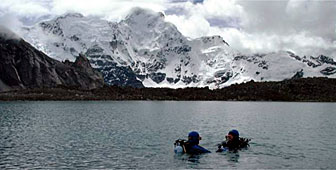Swiss divers reach new heights

Earlier this summer a team of Swiss divers broke the world altitude diving record. Two members of the expedition have told swissinfo how they managed it.
The seven men and women, all members of the ADN diving club in Geneva, set a first record on June 7, when they entered the Gyazumbha II Lake, lying at an altitude of 5,170 metres in the Nepalese Himalayas.
Two days later, two members of the team, Dominique Neuenschwander and Michel-Albert Chamot, set a new record in the 5,523 metre-high Gyazumbha VI Lake.
To break the record, they had to dive to a depth of more than five metres and remain there for more than 20 minutes, breathing only normal air.
“It was a magical experience,” Neuenschwander says. “You have the same feeling of joy as you feel when you climb a peak in the Himalayas.”
But the trip was not without its difficulties. Many of the computers and instruments the team had taken to Nepal did not work at such a high altitude. To complicate matters, normal diving pressure tables simply did not apply in the unique atmospheric conditions experienced in the Himalayas.
“At 5,000 metres, it’s exactly half the atmospheric pressure that you’d find a sea level,” Neuenschwander explained to swissinfo.
“But when you dive to over five metres, it’s like you’re back at sea-level again. You can breath easily again, and you feel fine. The problems happen when you resurface,” he says. “Your heart rate increases, you find breathing difficult and, if you come up too quickly, you can black out.”
The doctor on the trip, Jean-Yves Berney, is a lung specialist. He closely studied the effect of diving at altitude on the body during the expedition and he will publish his findings shortly.
“Different people adapted to the altitude in different ways,” says Valerie Neuenschwander, Dominique’s wife and another member of the team.
“At altitude, it’s physically exhausting. It’s hard to breathe, you get a lot of headaches and it’s difficult to sleep,” she told swissinfo
“But there are also psychological problems. You’re in an environment where you can’t be rescued if there’s an emergency, because the helicopter couldn’t get up that high. That’s why we had to plan the trip very carefully.”
The initial idea for the trip was Dominique Neuenschwander’s. An extreme-sport enthusiast and experienced mountain guide, it was his long-cherished ambition to combine his two passions – diving and mountain-trekking.
His website carries a favourite quote of his: “Do one stupid thing a year to stop yourself going mad”.
The expedition took six years to organise. First, Neuenschwander had to find the right members for his team, as well as sponsors. Then there was two years of physical training and diving in Switzerland’s highest lakes.
It’s perhaps appropriate that this record is now held by the Swiss, as landlocked Switzerland has the highest number of diving enthusiasts per head of population in the world.
Nevertheless, Valerie Neuenschwander says the physical and emotional concerns during the record attempts made it difficult at the time to appreciate what they had achieved.
“It’s great to know you have pushed yourself beyond your limits. But you don’t realise it at first, because you’re concentrating on keeping warm, taking pills for the headaches and supporting the weaker members of the team,” she says.
“It’s only later that there’s this explosion of joy. It takes a couple of days before you realise that you’ve done it, that you’ve fulfilled your goals.”
However, there remain other goals: “My one regret is that I did not dive into the higher lake with Dominique, but at the time I wasn’t mentally prepared to take the risk,” Valerie says.
“But if Dominique decides to make another expedition, I would go tomorrow,” she adds.
by Roy Probert

In compliance with the JTI standards
More: SWI swissinfo.ch certified by the Journalism Trust Initiative
You can find an overview of ongoing debates with our journalists here. Please join us!
If you want to start a conversation about a topic raised in this article or want to report factual errors, email us at english@swissinfo.ch.